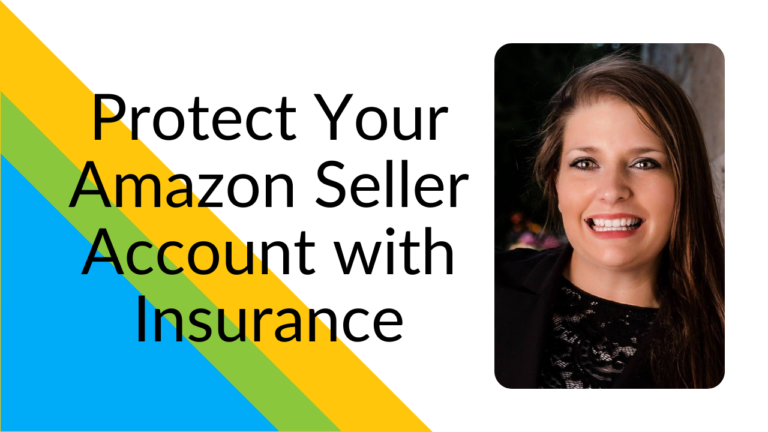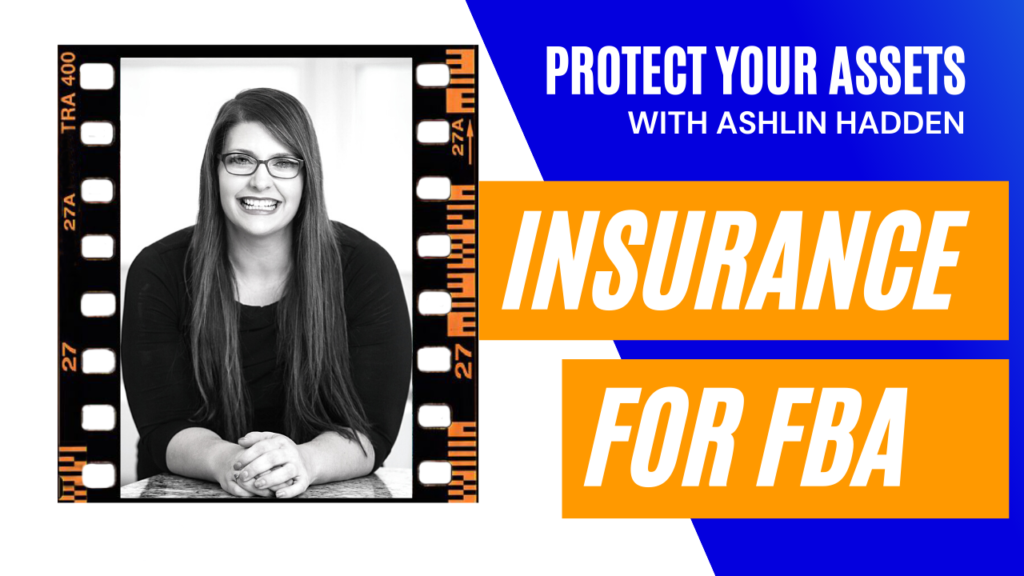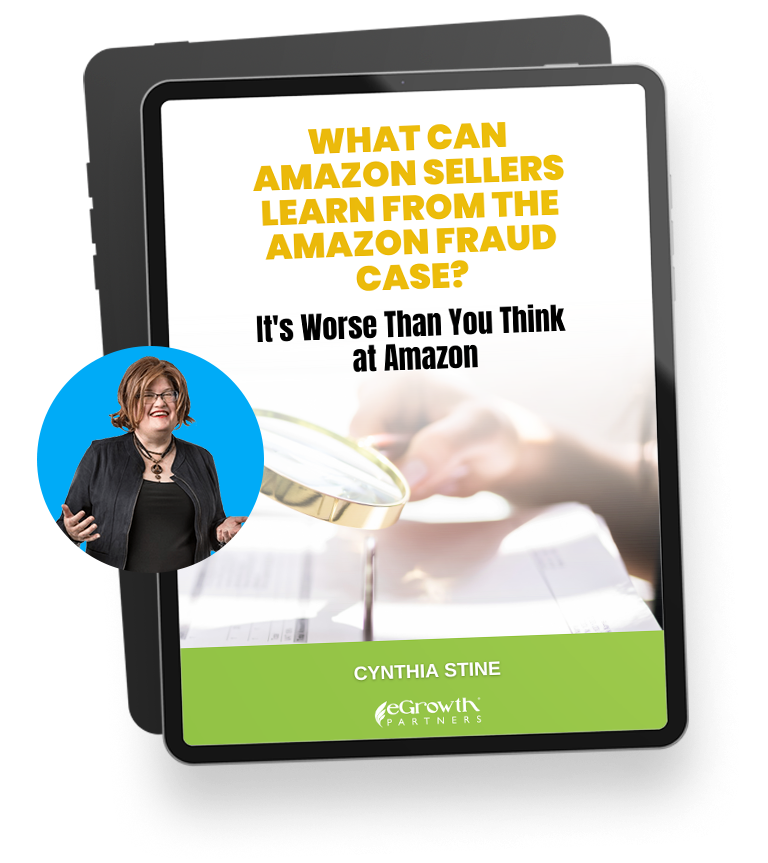Insurance is not optional for professional sellers. With Amazon now enforcing insurance coverage, sellers are scrambling to get the best insurance for their needs. I interviewed Ashlin Hadden, owner of Ashlin Hadden Insurance, to find out what sellers need to know.
When does Amazon require a seller to have insurance?
A: There is conflicting information out there, the response I received from Amazon is per Amazon Services Business Solutions Agreement (BSA). They communicated that insurance is required for ALL Pro Seller accounts. In the BSA when you sign up as a Pro Seller, you agree that you have insurance and that you will maintain insurance through the entirety of selling on your platform. The big news is that Amazon is sending letters to sellers that state they have met a specific threshold of $10,000 in sales for three consecutive months. Amazon insurance services told us that the sales threshold is the baseline where sellers must have insurance. Over time, we believe that all sellers are going to need to prove their insurance, but right now $10,000 for your three month sales revenue is the point that Amazon starts “checking” and enforcing their policy.
Our reading of the BSA is that all pro sellers need insurance and must provide a certificate of insurance to Amazon. In the past – as with today – they’ve not enforced this requirement until a seller reached this level of sales. Be aware that smaller sellers are still at risk for adverse events and should be covered, regardless of whether Amazon is insisting or not. For example, your homeowner’s umbrella policy generally will not cover a business running out of your home.
If sellers are all FBA, do they need insurance?
A: Yes, of course. It does not matter what program you are selling on. If you are putting products into the hands of consumers, then you need insurance! Amazon is very clear in the BSA that you need insurance that covers product liability, personal injury, property damage and more. If your product catches on fire and burns someone’s house down, that claim is on your insurance, not Amazon’s.
Our clients found that virtually nothing was covered by the carrier. Because so many reinstatement appeals require sellers to admit fault and how they are going to fix the problem going forward, the carrier considered them “guilty” and not covered. My argument was that any seller that was reinstated by Amazon should be covered as Amazon obviously agreed they should be allowed to sell. In addition, Amazon is suspending ASINs 3-4 times more frequently than accounts and ASINs which were not covered by insurance. I’m still hopeful a solution is found for sellers that will cover the huge losses that even a few days of suspension brings. In the meantime, companies like ours offer peace of mind with our retainer services. Reinstatements of all types are less expensive and more quickly resolved because we know your account inside and out. We can’t help you make your payroll, but we will work to get you back on Amazon as fast as possible.
I have insurance. How do I know if I have the right amount of coverage?
A: Compare your coverage to the BSA first and foremost. Make sure you have the correct amounts. However, a bigger issue typically isn’t if you have the correct amount, it is if you are classed in the correct way. We see a lot of people who go to the “local corner agent” that is not classed for online sales. Therefore, they are paying for a policy that will not payout on a claim if someone gets hurt by a product they sell. They thought they were doing the right thing, but they bought insurance that does not cover e-commerce sales.
Ashlin’s company will assess your insurance policy for free. It doesn’t matter who you bought it from. It is her service to the community. Contact her team.
I sell wholesale. I’m not the brand. Do I still need liability coverage?
A: Yes. You can still be sued for product failure, bodily injury and property damage. You are not protected by the brand’s insurance.
What mistakes do typical insurance agents make when working with Amazon sellers?
A: The biggest mistake they make is not knowing this industry. I believe they are trying to help but just don’t know all the crazy things sellers do. They may make the classifications wrong, don’t add product liability, nor know that there are things like private label and bundles and white label and drop-shipping. They just don’t know the right questions to ask to get you the right coverage. They are not involved in the industry. They don’t attend conferences or get involved in online groups. These mistakes could lead to a seller’s products not being covered in a lawsuit, for example.
If I’m an MF seller and the costs for package insurance from my carrier are eating me alive, can I reduce those costs with my own insurance policy?
A: That’s a great question, and the answer is maybe. The insurance is an annual policy, so we must make sure the cost of an annual policy doesn’t outweigh the total of the individual insurance. We take time to learn what you are doing and will be honest if we think you need to keep using parcel coverage. At a certain volume, package insurance is much cheaper than what is offered by the carriers, but there are multiple factors that go into the cost of coverage like the value of the items being sold (a laptop vs a toy, for example), the carrier you are using and where you are shipping (US or International).
What mistakes do you see Amazon sellers make when working with an agent?
A: The biggest mistake we see is Amazon sellers focusing on cost instead of risk. Sometimes sellers will be dishonest with us to receive a lower quote, not realizing they are jeopardizing themselves. Later when they learn they are not covered by an event, they are devastated. We ask very specific questions to uncover sellers’ needs and to protect them. Remember to be honest, it will benefit you.
What does Amazon need to see when they ask for proof of coverage?
A: They are looking for a Certificate of Insurance. They are looking to make sure that the certificate covers your business and the products you sell at $1MM or more. Here is the BSA policy.
The $1MM insurance coverage amount is the minimum. Depending on what you are selling and your volume, you may need more insurance than that. Amazon will also request an original copy of your insurance certificate, so keep that in mind as your deadline for compliance approaches.
When I first got insurance, some of the quotes were outrageous and some were incredibly cheap. I realized they were mis-categorizing me and my inventory. How do I properly explain what I need and how I sell so I don’t overpay or get under-covered?
A: It is very tricky if the agent doesn’t know Amazon. My test is this: if you tell your agent you want Private Label Insurance for FBA and they say “Huh?” RUN THE OTHER WAY! It will save you a lot of time and give you peace of mind if you have an agent who knows Amazon online seller requirements.
Additionally, make sure you have a company that will payout a claim. I have seen policies from the local agency that have exclusions for imported items. The person was a private label seller sourcing from China, so the policy that she bought from the local agent would not have covered any claim from her private label brand.
Does Amazon suspend sellers for not having insurance or for not having enough insurance?
A: Yes, they could. The BSA and the email from Amazon states sellers have 30 days to provide a certificate of insurance, or the account could be suspended.
We have not seen a suspension yet because our clients comply. However, if you miss the 30-day deadline, there is a definite risk now that they are enforcing their policy on insurance. Suspension is the hammer Amazon uses for most enforcement, so take it seriously.
I bet you’ve seen some heartbreaking cases of Amazon sellers suffering because of mistakes with their insurance. Can you give us an idea of what could happen?
A: I hear many stories of people who have claims that weren’t covered, but let’s celebrate a success today! We had a client who was selling in the exercise niche. She bought a policy that cost around $3k a year. On her exercise equipment, she had all the warning labels, how to install the device, and a link to a YouTube video about installing and using it correctly. We got a notice that someone got hurt when the device snapped off and hit him in the eye. The buyer claimed permanent eye damage and vision loss. Since our client had insurance, the carrier handled the claim. The carrier ended up settling for more than $600,000. If the seller hadn’t had insurance, she would have had to hire an attorney to defend herself and to pay the settlement out of pocket.
Ashlin and her team have helped many eGrowth Partners clients protect their businesses from possible disasters, and we recommend them. We are not paid for this recommendation in any way. I’ve been in business for 30+ years, and I know insurance is important. When I needed insurance for my Amazon selling business, I was so frustrated by the agents that I talked to because they could not understand what I did for a living. The quotes were insane. I remember telling one guy, “I’m not Amazon! I sell on Amazon!” Regardless of who you work with, I hope this information helps you get the right insurance for your business.
If you have employees, be sure to check your coverage if you are sued by an employee as well. You want at least $100K. Even if you have workman’s comp or umbrella coverage through another source, it usually doesn’t kick in until you hit $100K in legal fees, and they will do everything in their power not to payout. Word to the wise. Amazon doesn’t require this, but you need to think about all the risks in your business.
Pro Merchants who sell on Amazon must provide proof of Commercial General Liability insurance. This insurance, obtained at the merchant’s expense, shall cover up to $1,000,000 per occurrence and in the aggregate and must include product liability, bodily injury, or personal injury, property damage, and other requirements as stated in the Amazon Services Business Solutions Agreement. The insurance must indicate that “Amazon.com, Inc., and its affiliates and assignees” are added as additional insureds.
Summary of Requirements for Pro Merchant Insurance . The Certificate of Insurance must:
- Be an original document.
- Contain an Additional Insured Endorsement.
- List all Pro Merchants’ subsidiaries or DBAs covered by the certificate provided.
- Provide at least 30 days’ notice of cancellation, modification, or non-renewal.
- Show complete insurance carrier names as listed in the A.M. Best Property & Casualty Guide.
- Be completed in its entirety and signed.
- Please note: Binders are not acceptable.
- You must have Commercial General Liability (CGL), Umbrella and/or Excess Liability Insurance coverage with limits of not less than:
- $1,000,000 per occurrence, $1,000,000 in the aggregate for products and completed operations, and $1,000,000 in the general aggregate. Such insurance must include products liability, products/completed operations, bodily injury, personal injury, broad form property damage and broad form contractual coverage.
- You may also satisfy the insurance limits by using any combination of Commercial General Liability and Umbrella and/or Excess Liability insurance.
- The required Additional Insured wording must be as follows: “Amazon.com, Inc., its affiliates and assignees are additional insureds, as their interests may appear,” Amazon, P.O. Box 81226, Seattle, WA 98108-1226






